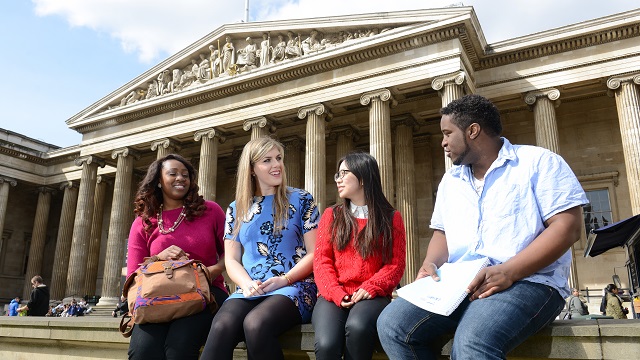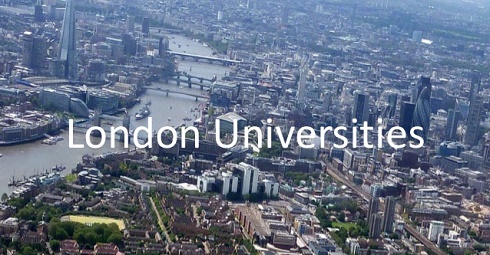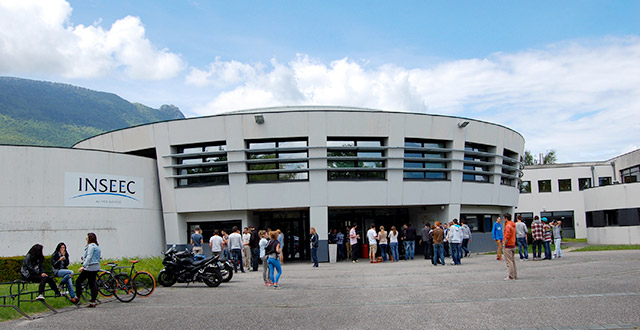One should allow plenty of time for your application. When applying to study in London, I would recommend starting at least six months in advance and having your IELTS test passed by then. I needed two reference letters, so I took one from my employer and one from the university where I did my bachelor’s. I also had to write a motivation letter about why I wanted to study in London at that particular university. And since I was an international student, the university issued a CASS number for my visa application.
The university application itself might not take long, but all the paperwork that overseas students have to do requires a lot of time. First month of student life in London is challenging, but very exciting! I arrived in late September, so London weather left much to be desired. It rained a lot, I had a language barrier, and because of the time difference I couldn’t really talk to my family back home when I wanted. At the same time, every day I would meet people from different corners of the world, learn about their culture and cuisine, and learn a couple of words, like “hello” and “thank you”, in their language.
I also went discovering the city and found myself next to the big London landmarks I used to see in English language books at school, which was amazing. One should get involved in career development activities. One of the main highlights of my student life in London was the opportunity for career development and networking. Every marketing student at my university became an affiliate at The Chartered Institute of Marketing (CIM).
As a part of CIM, every now and then we would have lectures where experienced marketing professionals would come and speak about their successful marketing campaign or current trends in marketing according to their research. Students and alumni could attend lectures like this and networking sessions that took place afterwards for free. We also had a residential weekend that gathered September and January cohorts together outside London, in a venue in beautiful Buckinghamshire, where we had a simulation game as if each group of students were running a company and had to compete against each other.
In the UK everything is very close, the transportation system is amazing, traveling is easy and there are student discounts. All you need is good company! So, every other weekend me and my friends would take a train or a bus and have a day trip to a different city. That is how I went to Cambridge, Oxford, Brighton, Bath and other UK cities. The biggest challenge of student life in London is not to get carried away with everything that the city has to offer. To study in London, especially for a master’s degree and for international students in particular, requires dedication and time.
There will be a lot to learn at lectures and even more left to learn through self-study. And since there is a lot to read, it’s important to keep up with the schedule. At the same time there is a lot to discover in the city – the history, culture, people and social life. It’s important to keep the balance between the studies and the city. The UK is a world leader in many areas of education including engineering, science, art and design, business and management, law and finance.
The UK’s reputation and legacy as a world centre for scientific research makes it a magnet for some of the very best thinkers in the world. With only one per cent of the world’s population, the UK is responsible for eight per cent of global scientific publications. The UK offers a world-renowned education system with qualifications that can make a real difference to your future. It attracts over 600,000 international students each year to a variety of programmes, ranging from English language courses to PhDs. The UK education system gives students the freedom to combine courses and subjects from different areas of studies, so you can tailor your degree to your own needs and interest.
LSE in one of the most famous universities in the U.K., founded in 1895 by Beatrice and Sidney Webb. The main focus of LSE is on social science institution. Today, over 10,000 students attended LSE. Sixty percent of these students are postgraduates. LSE is ranked #35 in the QA university ranking of the best universities in the world. LSE is second in the QS ranking by subject, for the study of Geography and Social Sciences and Management. According to the 2014 Research Excellence Framework, the school has the highest proportion of world-leading research studies among all British universities.
LSE is located in central London, near the boundary between Covent Garden and Holborn. Out of all European universities, LSE has educated the most billionaires according to a 2014 global census of dollar billionaires. Notable businesspeople who studied at LSE include George Soros and David Rockefeller. the National Union of Students and is responsible for campaigning and lobbying the School on behalf of students, as well as providing student support and the organization and undertaking of entertainment events and student societies.
Entry standards are also high for postgraduate students, who are required to have a First Class or high Upper Second Class UK honors degree.The applications success rate for postgraduate programs varies, although most of the major courses, including Economics, Management and Law, consistently have an acceptance rate below 7%.
The School guarantees accommodation for all first-year undergraduate students. LSE owns or operates eleven residence halls in and around central London and has agreements with three additional residences operated by urbanest. Together, these residences accommodate over 4,000 students. Whilst none of the residences are located at the Aldwych campus, the closest, Grosvenor House is within a five-minute walk from the School in Covent Garden. The farthest residences (Nutford and Butler’s Wharf) are approximately forty-five minutes by Tube or Bus. Each residence accommodates a mixture of domestic and international students, both male and female, and, usually, undergraduate and postgraduate.
New undergraduate students (including General Course students) occupy approximately 36% of all spaces, with postgraduates taking approximately 56% and continuing students about 8% of places. London School of Economics has a highly international student body, with over 155 countries represented. LSE had more countries represented by students than the UN. LSE Alumni in total are over 160,000, covering over 190 countries with more than 80 active alumni groups. The LSE Students’ Union (LSESU) is affiliated with the National Union of Students and is responsible for campaigning and lobbying with the School on behalf of students.
The LSESU also provides student support and organizes entertainment events and student societies. Founded in 1897, LSE Students’ Union is one of the oldest Students’ Unions in the U.K. and is often regarded as one of the most politically active in the country. This reputation goes back to the LSESU origins, when it held fortnightly political debates known as the ‘Clare Market Parliament’. The LSESU became notorious in the ’60s as a hotbed for left-wing radicalism. The LSESU also founded a weekly student newspaper in 1946 (this is one of the oldest student publications in Britain). LSESU fights for the rights of LSE students: A campaign called “Freeze the Fees” for example, was recently initiated in 2010-11 to fight against tuition increases..
The Union’s mascot was temporarily altered to a penguin. 2013-14 signaled a new approach for the LSESU. Rather than focus merely on one particular remit or issue, the LSESU officers instead widened the Union’s breadth of work and influence in forming the ‘ONE LSE’ directive. Nowadays, the president of the LSESU is Harold Craston – he was elected by all members of the Students’ Union.LSE takes into account all the information presented in the UCAS (Universities and Colleges Admissions Service) application and recruits students with “the best academic merit, potential and motivation, irrespective of their background.”
It expects applicants to have at least two full A-levels or IBDP (International Baccalaureate Diploma Programme) Higher Levels in subjects, though many applicants may offer three or four. The application information considered includes academic achievement (with predicted and achieved grades), subject combinations, personal statement, teacher’s reference, and educational circumstances (requirements may vary for programs and can be found on the LSE website). LSE looks at your grades from two years preceding your application.
Any qualifications, such as A-levels or AP, which you have not completed but expect to complete in summer, may be listed, too. For applicants from India, Standard 12 certifications from the CISCE, CBSE, and other boards with an overall average of 85-90 percent or percentages of marks or above 85 or 90 in each subject are accepted, depending on the board. If English is not your first language, then you need to get an English language qualification. You will need to provide proof of English language requirements at the time of admission, though this is not necessary during the application process.
LSE goes by the information given on your application form and doesn’t normally conduct interviews. What it really wants to see in your application and personal statement is your academic motivation and whether you are academically passionate about what you want to study, whether you have a considered interest in the degree you have chosen, and whether you have demonstrable evidence of this.
Applications are to be made online, via the UCAS (a guide to completing the application form is available on the LSE website). Applications usually open in September and close in mid-January. Although international applicants can send their applications from September 2019 to June 2020, LSE advises them to submit it by the deadline in January 2020 (for September 2020 entry; September 2021 for deferred applicants). Applications sent after January 2020 are considered only if there are still places available.
The LSE tuition fee for new overseas (non-UK and non-EU) undergraduates in 2020 is £21,570 ($27,712). The fee covers registration and examination fees, lectures, classes and individual supervision, lectures given at other colleges under intercollegiate arrangements, and membership of the Students’ Union. It does not cover living costs or travel or fieldwork. In addition, students should have a budget of £1,100-£1,300 per month for living expenses, including accommodation, travel, food, laundry, study costs, and other personal expenses.
LSE provides financial support in the form of bursaries and scholarships to students, including those from overseas. The LSE Undergraduate Support Scheme (USS) provides financial aid to overseas students who do not have the funds necessary to meet the cost of their study. The assistance depends on individual student’s needs, but is usually between £6,000 and £15,000.




















































